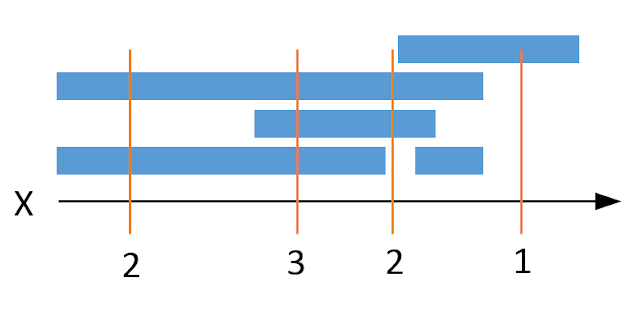Given an array of intervals intervals where intervals[i] = [starti, endi], return the minimum number of intervals you need to remove to make the rest of the intervals non-overlapping.
Example 1:
Input: intervals = [[1,2],[2,3],[3,4],[1,3]]
Output: 1
Explanation: [1,3] can be removed and the rest of the intervals are non-overlapping.
Example 2:
Input: intervals = [[1,2],[1,2],[1,2]]
Output: 2
Explanation: You need to remove two [1,2] to make the rest of the intervals non-overlapping.
Example 3:
Input: intervals = [[1,2],[2,3]]
Output: 0
Explanation: You don't need to remove any of the intervals since they're already non-overlapping.
Constraints:
1 <= intervals.length <= 105intervals[i].length == 2-5 * 104 <= starti < endi <= 5 * 104
We need to remove a few of the intervals to maximise the non-overlapping intervals. If it is not sorted, we need to compare each interval with other intervals which is O(N^2).
So, let's sort first. But, do we need to sort based on start time or finish time. Let's research.
1. Sort based on start time (Earliest starting Time)
Example: [[1, 2], [2, 3], [1, 3], [3, 4]]
Output: [[1, 2], [2, 3], [3, 4]]
Solution :
After sorting [[1, 2], [1, 3], [2, 3], [3, 4]].
If two intervals' start time is same, remove the second interval [1, 3] as both intervals have the same start time. The output would be [[1, 2], [2, 3], [3, 4]]
Counter Example: [ [2, 3], [1, 6], [1, 2], [3, 4]]
Output: [[1, 2], [2, 3], [3, 4]]
Solution :
After sorting [[1, 6], [1, 2], [2, 3], [3, 4]].
Remove [1, 2] as both intervals have the same start time. The output would be [[1, 6], [2, 3], [3, 4]] but this is overlapping intervals.
2. Sort based on finish time (Earliest Finishing Time)
Example: [ [2, 3], [1, 6], [1, 2], [3, 4]]
Output: [[1, 2], [2, 3], [3, 4]]
Solution :
After sorting [[1, 2], [2, 3], [3, 4], [1, 6]].
If the previous intervals finish time is greater than next interval's start time, remove next interval [1, 6] as it will overlap. The output would be [[1, 2], [2, 3], [3, 4]] and this is the optimal solution.
bool sortFinish(vector<int>& a, vector<int>& b) { return a[1] < b[1]; } class Solution { public: int eraseOverlapIntervals(vector<vector<int>>& intervals) { int n = intervals.size(); if (n <= 0 || n > 100000) { return 0; } for (int i = 0; i < n; i++) { if (intervals[i].size() > 2) { return 0; } } sort(intervals.begin(), intervals.end(), sortFinish); #if 0 cout << "After sorting\n "; for (int i = 0; i < n; i++) { cout << "\nstart " << intervals[i][0] << " finish " << intervals[i][1] << endl; } #endif int minRemove = 0; vector<int> prev = intervals[0]; for (int i = 1; i < n; i++) { if (prev[1] > intervals[i][0]) { minRemove++; } else { prev = intervals[i]; } } return minRemove; } };

Comments
Post a Comment